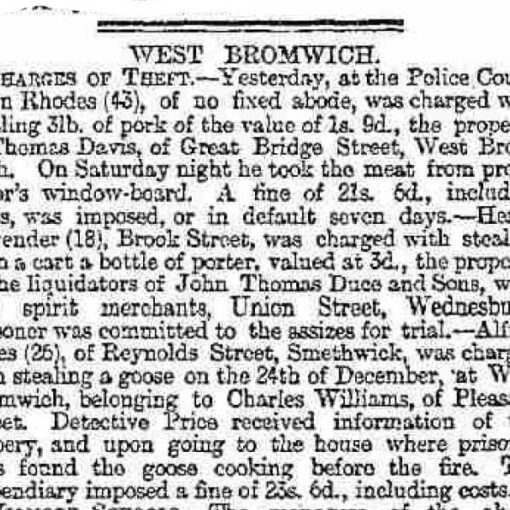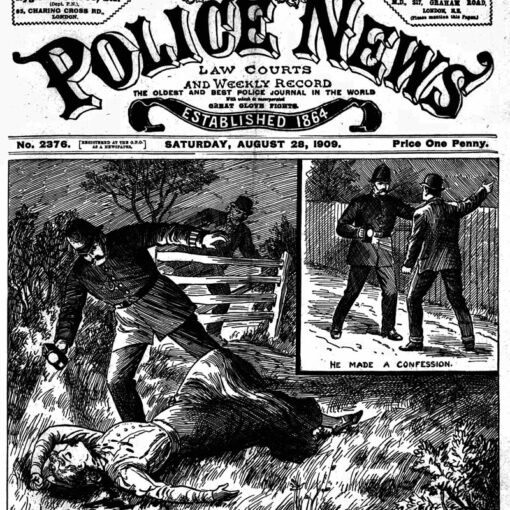Worthing Gazette – Wednesday 28 December 1892
Worthing Police Court

Petty Sessions, This Day—Before Mr. T. Gaisford (Chairman), the Mayor (Alderman E. C. Patching), Lieut.-Colonel Wisden, Major A. Henty, Mr. H. H. Hargood, and Mr. C. L. M. Teesdale. Captain Drummond, the Chief Constable, occupied a seat on the Bench.
Occasional Licence
On the application of Mr. G. Kidd, Mr. Brough, landlord of the Brunswick Hotel, was granted an occasional licence for the sale of excisable liquors at the Assembly Rooms on the night of the 2nd of January, on the occasion of a ball.
An Unmanageable Boy
George Voice appeared to an adjourned summons which alleged against him a breach of the Education Bye-laws of the Borough. The case was further adjourned for a week, as arrangements are being made for the boy’s admission to an Industrial School.
A Dangerous Dwelling
Mr. W. Verrall, Town Clerk, appeared in support of a summons against James Bashford for a breach of the Towns Improvement Clauses Act, 1847, it being alleged that a house of which he is the occupier, namely, No. 15, Field-Row, is in a condition dangerous to the public. Bashford said he was not in a position to pay for the necessary repairs. In answer to Colonel Wisden, the Clerk (Mr. M. Goodman) said the owner of the premises was not known, and the defendant paid no rent.
Colonel Wisden: Then he can afford to pay for the repairs. Evidence as to the dangerous condition of the building was given by Mr. Miles Aspinall, the Borough Surveyor, and the service of the notice was proved by Mr. F. C. Cook, an assistant in the Surveyor’s office. The Bench made an order upon Bashford requiring him to have the necessary repairs carried out within fourteen days.
Context and Use for Historians
This document, published in the Worthing Gazette on 28 December 1892, provides insight into the legal and social framework of late Victorian England, particularly at the municipal level. It highlights several significant points of interest for historians:
- Municipal Governance and Justice:
- The document illustrates the structure and personnel of the local judiciary system, including the participation of various public officials such as aldermen and military officers.
- The Chief Constable’s involvement underscores the integration of law enforcement and judiciary processes.
- Regulation of Public Events:
- The granting of an occasional licence for excisable liquors reflects the strict regulatory oversight on public gatherings and alcohol consumption in the 19th century.
- Education and Juvenile Discipline:
- The case of George Voice provides an example of how breaches of education laws were handled. The proposed solution of sending the boy to an Industrial School suggests societal attitudes towards juvenile delinquency and the role of education in addressing it.
- Housing and Urban Improvement:
- The issue with the dangerous dwelling highlights public health and safety concerns of the era. The enforcement of the Towns Improvement Clauses Act, 1847, shows the legal mechanisms in place to ensure building safety.
- The financial status of the occupier and the challenge of identifying property ownership reflect broader issues of poverty and urban housing conditions.
- Local Administration:
- The involvement of town clerks and surveyors demonstrates the administrative processes behind urban regulation and law enforcement.
For historians, this document is a valuable primary source that sheds light on the interplay between social conditions, governance, and legal practices in Victorian England. It can be used to study local government structure, attitudes towards education and juvenile behaviour, and housing issues during the period.
Throwback to 1892: Worthing Police Court tackles housing safety, juvenile discipline, and public event licensing. A snapshot of Victorian-era law & order. 🏛️ #VictorianHistory #WorthingGazette #LocalGovernance #SocialHistory #HistoricalDocuments
Free to use British Newspaper Research Service
British newspapers offer a treasure trove of information for family historians. They capture moments in time, providing context, character, and community insight that official records cannot. With the free service provided by Old British News, this research becomes even more accessible, enabling historians to delve into rich, untold stories of their relatives. By combining these resources with other records, family historians can create a more complete and engaging picture of the past.
I search historical articles to locate mentions of your ancestors—whether they were involved in notable events or simply part of the everyday life reported in these newspapers. If relevant articles are found, I deliver them to you in a PDF format at no cost.
If I find articles, they’ll be sent to you in a clear, organised PDF. If not, you’ll be informed right away. See here.




